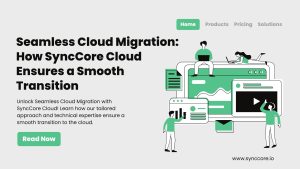Introduction:
In today’s fiercely competitive business arena, effective customer relationship management (CRM) stands as a crucial driver of success. To meet the continuously evolving demands of a customer-focused era, businesses are turning to inventive solutions, and one pivotal innovation is the integration of cloud services into CRM systems. This piece delves into the transformative influence of cloud services on CRM and how businesses can capitalize on this powerful combination to cultivate stronger customer relationships.

The Progression of CRM through Cloud Services: Traditionally, CRM systems were confined to on-premises solutions, limiting accessibility and adaptability. However, the emergence of cloud services has revolutionized this landscape, enabling businesses to securely store, manage, and analyze customer data in a centralized environment accessible from any location at any time. This shift signifies a substantial evolution in organizations’ approaches to customer relationship management.
Accessibility and Versatility: Cloud-based CRM solutions offer unparalleled accessibility, enabling users to access crucial customer data across various devices and locations. Whether employees are operating from the office, remotely, or while on the move, cloud services ensure seamless access to real-time customer information. This adaptability not only fosters collaboration among teams but also empowers businesses to promptly respond to customer inquiries and ever-changing market dynamics.
Scalability and Cost-Efficiency: Cloud services designed for CRM present scalable solutions that grow in tandem with business expansion. As companies broaden their customer base and data volume, cloud platforms effortlessly accommodate increased workloads. The pay-as-you-go model of cloud services ensures that businesses only pay for the resources they utilize, eliminating the necessity for significant upfront investments in hardware and infrastructure. This cost-effective approach renders CRM accessible to businesses of varying sizes.
Data Security and Compliance: Ensuring the security of sensitive customer information is paramount. Cloud service providers implement robust security measures, including encryption, authentication, and regular audits, to safeguard CRM data. Facilitating compliance with industry regulations such as GDPR and HIPAA, cloud services ensure that businesses adhere to legal standards, thereby fostering trust with their customers.
Integration Capabilities: Cloud-based CRM solutions seamlessly integrate with other business applications, establishing a unified ecosystem. Integration with marketing automation, sales, and customer support tools streamlines processes, reduces manual data entry and offers a comprehensive view of customer interactions. This interconnected approach heightens efficiency and enables businesses to make informed, data-driven decisions.
Enhanced Customer Insights: Leveraging advanced analytics and artificial intelligence, cloud-based CRM systems extract valuable insights from customer data. This capability enables businesses to gain a deeper understanding of customer preferences, behaviors, and trends, facilitating the creation of personalized engagement strategies. This proactive approach to customer relationship management contributes to heightened customer satisfaction and loyalty.
Conclusion:
Integrating cloud services into CRM systems represents a paradigm shift in how businesses cultivate and nurture customer relationships. The accessibility, scalability, cost-efficiency, security, integration capabilities, and enhanced insights offered by cloud-based CRM solutions position them as a cornerstone for business success in the digital age. As businesses strive to maintain a competitive edge, leveraging cloud services for CRM is not merely an option—it’s a strategic necessity. Embrace the potential of the cloud to revolutionize your approach to customer relationship management and embark on a journey toward sustained growth and customer satisfaction.



